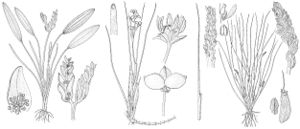Scheuchzeriaceae
Herbs, perennial, rhizomatous, caulescent; turions absent. Leaves alternate, emergent, sessile; sheath with remains often persisting, auriculate; blade linear, nearly cylindric, with conspicuous round pore adaxially on leaf tip; intravaginal squamules hairs, numerous. Inflorescences terminal, bracteate racemes, not subtended by spathe; pedicels following fertilization elongating, not spiraling. Flowers bisexual; subtending bracts present; perianth present; tepals 6; stamens 6, epitepalous; anthers basifixed, distinct, dehiscing longitudinally, extrorse; pollen globose; pistils 3 (–6), distinct to slightly connate at base; ovules basal-marginal, anatropous. Fruits follicles. Seeds 1–2 (–3).
Distribution
Colder parts of the Northern Hemisphere
Discussion
Scheuchzeriaceae have sometimes been included in Juncaginaceae. That Scheuchzeria represents a family by itself is accepted by the majority of post-1940 workers (J. W. Thieret 1988).
Genus Genera 1, species 1:
Selected References
Lower Taxa
Illustrations
| Family ⠉ | Taxon | Illustrator ⠉ | |
|---|---|---|---|
 | Scheuchzeriaceae Aponogetonaceae Juncaginaceae | Scheuchzeria palustris Aponogeton distachyos Lilaea scilloides | John Myers John Myers John Myers |
"elongating" is not a number.